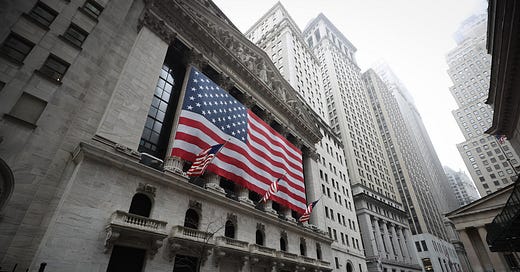Bailing on the Bailout
I haven't written too much about the current financial crisis/bailout/circus of late, partly because I'm still trying to figure it all out, and partly because I've written before about the problem of big government handling anything. While I love being right, I hate being redundant.
I was not in favor of a bailout, yet assumed it was going to pass, only to be somewhat surprised it didn't (at least as of Monday). My mentality and situation mirror those of my friend, Clay, with whom I've exchanged an email or two about all this. He writes:
"I don't have a lot of capital in this game, so I can be pretty free and easy with my opinions. I could be labeled a constrained visionist (a la Sowell) and have a core belief, a faith, that the free market system (process belief) is better able to sort this out than Hank and Ben (unconstrained, result-oriented action). If I have to bet my (lack of) wealth on anything, I'll take the market over Bush any time."
I've always thought of myself as a free-market guy, too, though Robert T. Miller's A Conservative Case for the Paulson Plan gave me pause to think on it a few days back:
"Are you an economic conservative who thinks that the government should intervene in the market only when markets fail and it is efficient for the government to act? Then you should support the bailout plan because what we are seeing in the credit markets is probably the most serious market failure that will occur in our lifetimes. Are you an economic conservative who thinks the government spends too much and the national debt is too high? Then you should support the bailout plan because the government will likely make money in the long run and so reduce the deficit. The intelligent conservative position here is to support the bailout."
Then this morning, I confess I almost drank the bailout Kool-Aid when my usual voice-of-reason hero, New York Times columnist David Brooks, criticized the Congress as being leaderless in their "no" decision regarding the proposed bailout:
"This generation of political leaders...have failed utterly and catastrophically to project any sense of authority, to give the world any reason to believe that this country is being governed. Instead, by rejecting the rescue package on Monday, they have made the psychological climate much worse....The only thing now is to try again - to rescue the rescue. There’s no time to find a brand-new package, so the Congressional plan should go up for another vote on Thursday, this time with additions that would change its political prospects."
Hmmm.
Later this afternoon, however, I came across Jeffrey Miron, senior lecturer in economics at Harvard and one of 166 academic economists who signed a letter to congressional leaders last week opposing the bailout plan. In a special to CNN, he wrote a commentary titled "Bankruptcy, not bailout, is the right answer," saying:
"The obvious alternative to a bailout is letting troubled financial institutions declare bankruptcy. Bankruptcy means that shareholders typically get wiped out and the creditors own the company. Bankruptcy does not mean the company disappears; it is just owned by someone new (as has occurred with several airlines). Bankruptcy punishes those who took excessive risks while preserving those aspects of a businesses that remain profitable."
At the end of the piece, Miron gets practical as to where we go from here:
"So what should the government do? Eliminate those policies that generated the current mess. This means, at a general level, abandoning the goal of home ownership independent of ability to pay. This means, in particular, getting rid of Fannie Mae and Freddie Mac, along with policies like the Community Reinvestment Act that pressure banks into subprime lending...The right view of the financial mess is that an enormous fraction of subprime lending should never have occurred in the first place. Someone has to pay for that. That someone should not be, and does not need to be, the U.S. taxpayer."
That resonated with my gut sense. Why bail out a bad system? This again from Clay:
"All I know with respect to handing this Administration vast discretionary power over something of immense national importance is, 'Once bitten, twice shy...' The market abuses that went on came from a lack of information and transparency and a lack of timely-targeted regulation to mitigate the worst of unregenerate human nature."
In other words, we have met the enemy, and he is us; that's a concept I get (and a biblical one, too). True, the system was bad, but who created the system? Government leaders pandering to a constituency demanding cheap loans with little accountability.
I remember reading an intriguing book a few years ago by Jane Jacobs called Dark Age Ahead. Jacobs, an urbanist, argued North American civilization showed signs of spiral decline comparable to the collapse of the Roman empire. Her thesis focused on “five pillars of our culture that we depend on to stand firm" (see the last one especially):
the nuclear family
education
science
representational government and taxes
corporate and professional accountability
Have we officially arrived at Jacobs' "dark age" in America? Are you for or against a government bailout? From my perspective, It's time to own our mistakes and, while it might will be hard, reap what we've sown in the way we've handled our economy; God, after all, will not be mocked (Galatians 6:7-8).




